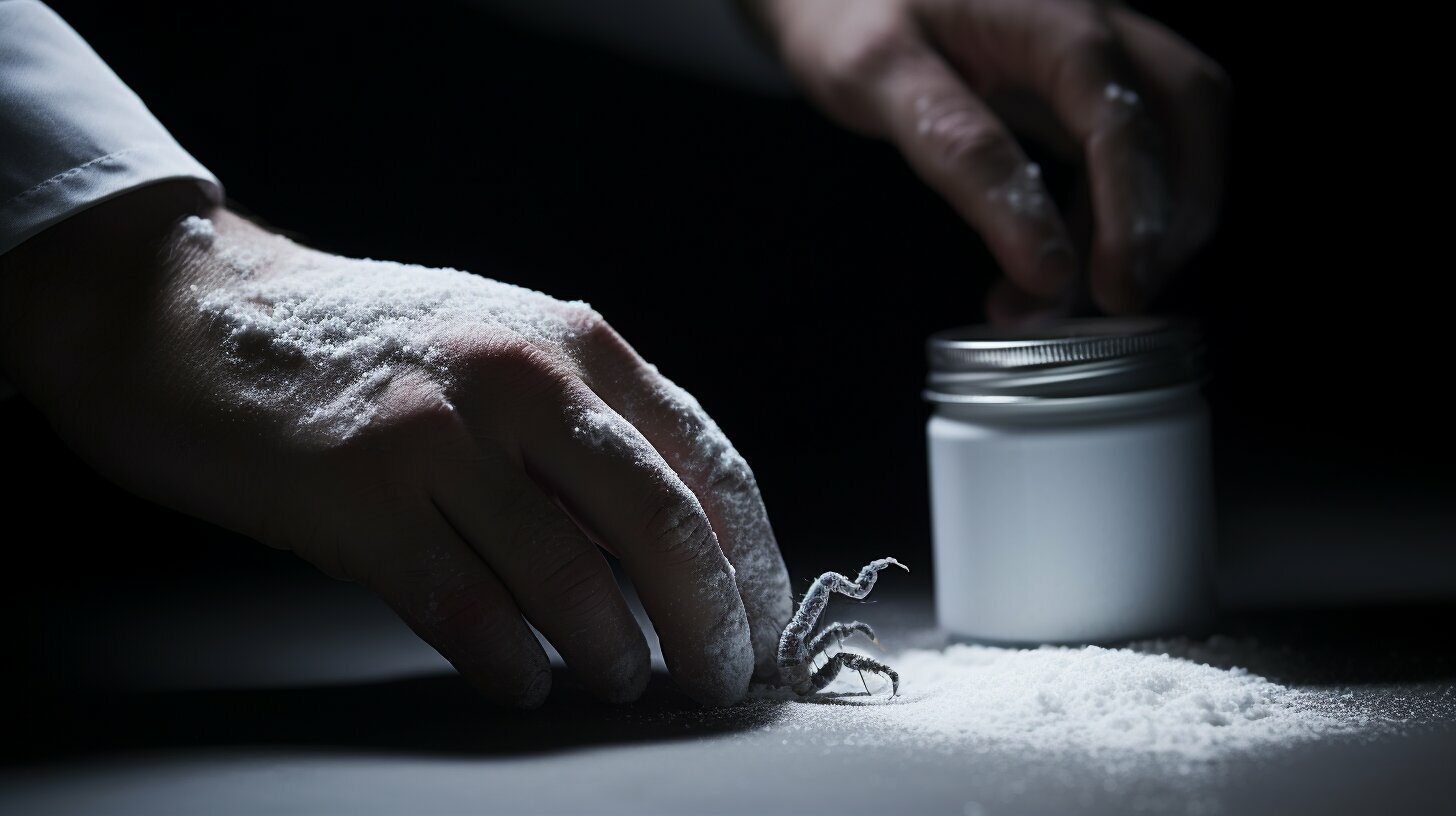Centipedes are creepy crawlies that can invade your home and cause a lot of discomfort. These pests are fast-moving and can be difficult to catch, making them a menace to deal with. However, boric acid has been proven to be an effective and natural way to eliminate centipedes from your home.
In this guide, we will discuss everything you need to know about using boric acid to kill centipedes, from understanding their behavior to applying the treatment and preventing future infestations. Follow these steps to keep your home free of these unwanted invaders.
Key Takeaways:
- Boric acid is a natural and effective way to kill centipedes.
- Understanding centipedes’ behavior can help you target problem areas.
- Boric acid works by dehydrating and damaging the exoskeleton of centipedes.
- Take necessary precautions when handling boric acid.
- Apply boric acid to areas prone to centipede activity and monitor its effectiveness.
- Use preventive measures to reduce future centipede infestations.
- Alternative natural methods can complement the use of boric acid.
Understanding Centipedes and Their Behavior
Centipedes are elongated, fast-moving arthropods with long, segmented bodies and numerous legs. They are commonly found in dark, damp areas such as basements, bathrooms, and crawl spaces. While they are generally harmless, their presence can cause discomfort and fear among homeowners.
Centipedes are known for their predatory behavior and feed on insects, spiders, and other small arthropods. They are primarily active at night and prefer moist environments. Female centipedes lay their eggs in damp soil or other suitable environments, and the young hatch within a few weeks.
Centipedes can enter homes through cracks and gaps in walls, windows, and doors. They can also be carried in through potted plants or other items from outside. Once inside, they can hide in cracks and crevices and can be difficult to detect.
Boric acid is a safe and natural way to eliminate centipedes without harming humans or pets. Its effectiveness lies in its ability to disrupt the centipede’s nervous system, leading to dehydration and death. By understanding centipedes’ behavior and habitat, homeowners can take proactive steps to prevent infestations and apply boric acid effectively.
The Science Behind Boric Acid’s Effectiveness
Boric acid is a natural insecticide that is highly effective in controlling centipedes. It is a white powder that is derived from boron, a mineral that occurs naturally in rocks, soil, and water. Boric acid works by disrupting the digestive and nervous systems of centipedes, ultimately leading to their death.
When centipedes come into contact with boric acid, they are exposed to its desiccating properties. This means that boric acid causes the water inside the centipede’s body to be depleted, leading to dehydration and ultimately death. Additionally, boric acid can damage the centipede’s outer layer, leading to further dehydration and a breakdown of the insect’s internal organs.
Boric acid also has a slow-acting effect, which makes it an ideal solution for controlling centipedes. Centipedes that come into contact with boric acid will not die immediately but will instead carry the powder back to their nests. This helps to spread the boric acid throughout the colony, eventually leading to the death of all centipedes in the area.
Furthermore, boric acid is a safer alternative to many chemical insecticides. It has low toxicity for humans and pets, making it a safer option for homes with children and animals. However, it is important to use boric acid safely and follow proper instructions to minimize any potential risks.
Preparation and Safety Measures
Before using boric acid to eliminate centipedes, it is important to take necessary precautions to ensure safe and effective use. Failure to follow the proper safety measures can lead to health hazards for humans and pets.
Protective Gear
Prior to applying boric acid, it is advisable to wear protective gear such as gloves, a mask, and goggles to prevent direct contact or inhalation. Always check the manufacturer’s instructions for recommended safety gear.
Mixing Instructions
When using boric acid, it is important to mix it with water according to the recommended instructions. Never mix boric acid with other pesticides or chemicals as it may create toxic fumes.
Avoiding Contamination
It is advisable to avoid contaminating food or water sources when applying boric acid. Cover edible items in the area and do not allow pets or children to come into contact with treated surfaces until the boric acid has settled and dried.
Storage
Store boric acid in a cool, dry place away from direct sunlight and sources of heat. Keep it out of reach of children and pets.
By following these safety measures, you can ensure safe and effective use of boric acid to eliminate centipedes.
Applying Boric Acid to Eliminate Centipedes
Now that you are familiar with the science behind boric acid’s effectiveness against centipedes and have taken necessary safety measures, it’s time to apply it. Follow these steps for an effective centipede control:
- Locate problem areas: Centipedes prefer damp, dark places such as basements, bathrooms, and laundry rooms. Look for cracks, crevices, and other entry points that they may use to gain access to your home.
- Thoroughly clean and dry the area: Centipedes are attracted to moisture, so make sure the area is dry before applying boric acid.
- Apply boric acid: Sprinkle boric acid powder in areas where centipedes are likely to travel, including behind appliances, along baseboards, and in cracks and crevices. Use a small brush to spread the powder evenly.
- Reapply as necessary: Reapply boric acid every few weeks until centipede activity ceases.
Note that boric acid is not an instant solution and may take some time to work. Be patient and consistent with your efforts.
Monitoring and Evaluating Results
Once you have applied boric acid as a centipede control method, it is crucial to monitor the results to evaluate its effectiveness. This will help you determine if additional treatment is required or if the existing treatment has resolved the problem.
Check the treated areas regularly for any signs of centipede activity. Look for dead centipedes, decreased centipede sightings, and reduced activity around treatment areas. If you notice continued activity, reapply the boric acid treatment or try another control method.
Assessing the Success of Your Treatment
To evaluate the effectiveness of boric acid treatment, you can use different methods, including:
- Counting the number of centipedes found before and after treatment.
- Comparing the number of centipedes found in treated and untreated areas.
- Observing the rate of centipede activity reduction over time.
Remember, the success of any centipede control method depends on several factors, such as the size of the infestation, the location, and the extent of the treatment. Be patient and persistent, and don’t hesitate to seek professional help if necessary.
Preventing Centipede Infestations
To reduce the likelihood of future centipede infestations, it’s essential to take preventive measures. While boric acid can help kill centipedes, it’s also crucial to make your home less attractive to them. Here are some ways to prevent centipedes from entering your home:
- Seal off cracks and crevices in walls, floors, and foundations.
- Install weather stripping on doors and windows.
- Remove clutter, piles of wood, and debris from around your home’s perimeter.
- Reduce moisture levels in basements, crawl spaces, and bathrooms by using dehumidifiers and fixing leaks.
- Keep your home clean and free of food debris that can attract centipedes and their prey.
Boric acid can also help in preventing centipede infestations. Since it is a desiccant, it can dry out the centipedes’ exoskeletons, making it difficult for them to survive. By regularly applying boric acid in areas where centipedes are likely to hide, you can deter them from entering your home.
Other Natural Centipede Control Methods
Boric acid is certainly an effective solution for centipede control, but there are other natural methods that can be used in conjunction with or as an alternative to boric acid. Here are some other ways to naturally eliminate centipedes:
- Diatomaceous earth: This powder is made from fossilized remains of tiny aquatic organisms called diatoms. It is abrasive and can penetrate the exoskeleton of centipedes, causing them to dry out and die.
- Cedar oil: This oil has a strong scent that repels centipedes.
- Lavender oil: This oil also has a strong scent that centipedes find unappealing.
- Eucalyptus oil: This oil has a strong scent that centipedes find irritating.
- Sticky traps: These traps work by trapping centipedes in a sticky substance, preventing them from moving around and eventually leading to their demise.
It’s important to note that these natural methods may not be as effective as boric acid, but they can be used as a supplement or alternative depending on individual preferences.
Conclusion
In conclusion, using boric acid to kill centipedes is a safe, natural, and effective solution. By following the step-by-step guide provided in this article, homeowners can eliminate centipede infestations in their homes without posing a risk to their health or the environment.
Remember, prevention is key to avoiding future centipede infestations. Keep your home clean and dry, seal any entry points, and use boric acid as a deterrent in problem areas.
If you’re searching for alternative natural methods for centipede control, consider using diatomaceous earth or sticky traps. While not as effective as boric acid, these methods can complement its use or serve as an alternative for those who prefer not to use boric acid.
Don’t wait until it’s too late. Take action today to protect your home from centipede infestations. With the guidance provided in this article, you’re well on your way to achieving a centipede-free home.
FAQ
Q: How does boric acid work to kill centipedes?
A: Boric acid acts as a stomach poison for centipedes. When they come into contact with it, the boric acid sticks to their legs and bodies. As centipedes groom themselves, they ingest the boric acid, which ultimately leads to their demise.
Q: Is boric acid safe to use around children and pets?
A: When used as directed, boric acid is considered safe for use around children and pets. However, it is advisable to take precautions and keep them away from treated areas until the boric acid has settled or dried.
Q: How long does it take for boric acid to kill centipedes?
A: The time it takes for boric acid to eliminate centipedes can vary depending on the severity of the infestation. In most cases, it may take a few days to a couple of weeks to see a significant reduction in centipede activity.
Q: Can I use boric acid outdoors to control centipedes?
A: Boric acid can be used outdoors to control centipede populations. It is recommended to apply it to areas where centipedes are likely to hide, such as cracks and crevices, and along the foundation of the house.
Q: Do I need to reapply boric acid after it has been applied?
A: In some cases, it may be necessary to reapply boric acid if centipede activity persists. However, it is important to first monitor the effectiveness of the initial application and evaluate if further treatment is required.
Q: Are there any other benefits of using boric acid for centipede control?
A: Yes, boric acid not only eliminates centipedes but also acts as a deterrent, preventing future infestations. It is a natural and environmentally friendly solution that can be an effective long-term strategy for keeping centipedes at bay.
Q: Can boric acid be used on other pests besides centipedes?
A: Yes, boric acid can be effective against other pests such as ants, cockroaches, and silverfish. However, it is important to follow specific instructions for each pest and ensure the safety of its use in different environments.
Q: Are there any natural alternatives to boric acid for centipede control?
A: Yes, there are other natural methods for centipede control, such as diatomaceous earth, essential oils, and sticky traps. These methods can be used in conjunction with or as an alternative to boric acid, depending on the specific situation.

